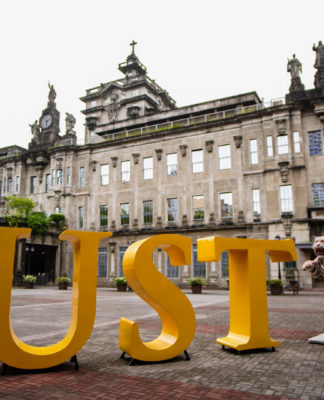Pope Benedict XVI won’t have to remind the Pontifical University on the importance of philosophy as Thomasians are most privileged to have St. Thomas Aquinas as their alma mater’s patron saint, who is regarded as one of the most important thinkers and theologians of all times.
Last June, the Pope called on educational institutions to give more attention to philosophy to mold one’s faith that is founded on reason. The appeal was due to the seeming deviation of technology from the natural law, which distinguishes the philosophy of Aquinas.
At UST, it is emphasized that philosophy, especially that of Aquinas, is not meant for Christians alone.
“The works [of St. Thomas Aquinas] were made for everyone, Catholic and non-Catholic alike, to understand,” Ecclesiastical Faculty of Philosophy Dean Fr. Enrico Gonzales, O.P. told the Varsitarian. “He was a big theologian, who was able to synthesize faith and reason in good harmony.”
To emphasize the relevance of Aquinas, who was canonized 685 years ago on July 18, 1323, the UST Ecclesiastical Faculties held a July-wide series of symposia on the applications of the natural law in various fields and concerns.
Aside from being one of the 33 doctors of the Church, Aquinas is also hailed as the Catholic Church’s greatest theologian.
Among his remarkable works were the Summa Contra Gentiles and the Summa Theologica. The latter is sought for its five scholastic proofs on the existence of God.
In fact, the only books placed on the altar at the Council of Trent, the 16th century ecumenical council for a definitive determination of the doctrines of the Church, were the Bible and Aquinas’ Summa Theologica.
“The Summa Theologica and the Summa contra Gentiles are classical theological works,” Gonzales said.
His works were defined as the “Christianized Aristotelian philosophy,” which reconciled Aristotelian methods of inquiry with Christian doctrines. Aquinas pegged his philosophical compositions on Aristotle’s perspective of man as a rational animal, causing ruckus within the Catholic community on whether his opus was to be considered orthodox or otherwise.
It was until Aquinas’ death on March 17, 1274 that the Church began to acknowledge his works as a theologian and chaste lover of God.
In 1319, the Roman Catholic Church started looking into his profile, which paved the way for his canonization as a saint by Pope John XII, thus erasing all controversies surrounding his philosophy. Aquinas was of such remarkable character that he was placed at par with Saints Paul and Augustine, who were also considered as Doctors of the Church.
In 1924, Aquinas received the title Doctor Angelicus (Angelic Doctor) from Pope Pius X.
Thomasian privilege
Gonzales said that in recognition of Aquinas’ significant role in the Christian world, Thomasians should stand up for the very saint upon whose teachings the University was founded.
“His importance for the University is as important as knowing what your name is,” Gonzales said.
Born to a family of noblemen, he was sent only at a tender age of five to study in a monastery. He then sought higher studies at the University of Paris under the tutelage of another Dominican saint, Albert the Great (Albertus Magnus).
When Aquinas was nineteen, he joined the Dominican order, which displeased his family who wanted him instead to enter the Benedictine monastery where his uncle was an abbot.
Because of this, Aquinas’ parents locked him in a tower for almost two years before finally allowing him to pursue his priestly vocation with the “hounds of God,” the Dominicans.
“Aquinas was a man of dialogue, he was very open-minded. He believed that everyone had an access to truth and that truth was acquired through dialogue,” Gonzales said.
“He (Aquinas) was a product of his time. The language that he used for his theology is very academic because he was a product of the academic circle,” Gonzales added. Christine Joyce S. Placino

















Really great visual appeal on this web site, I’d value it 10.